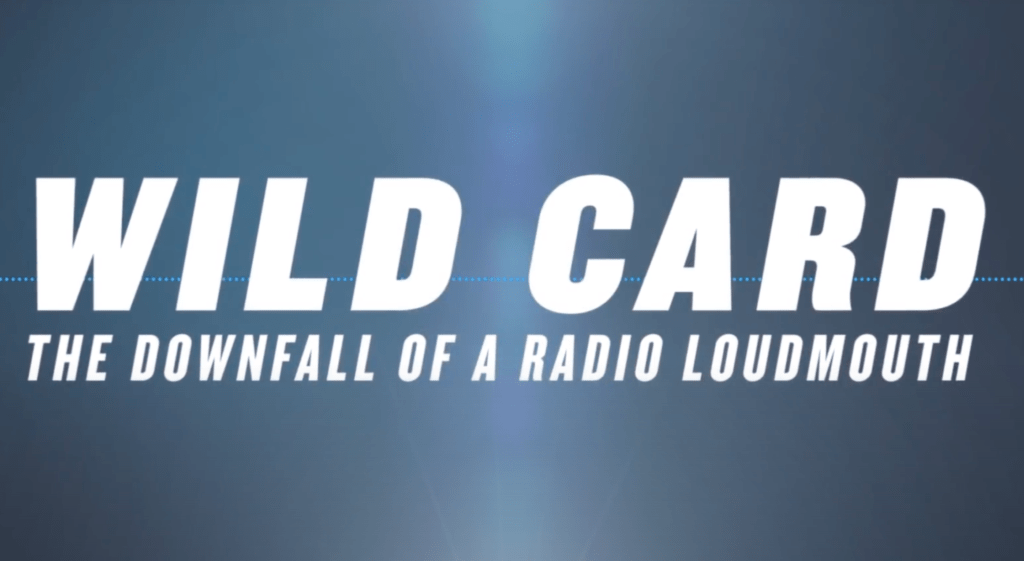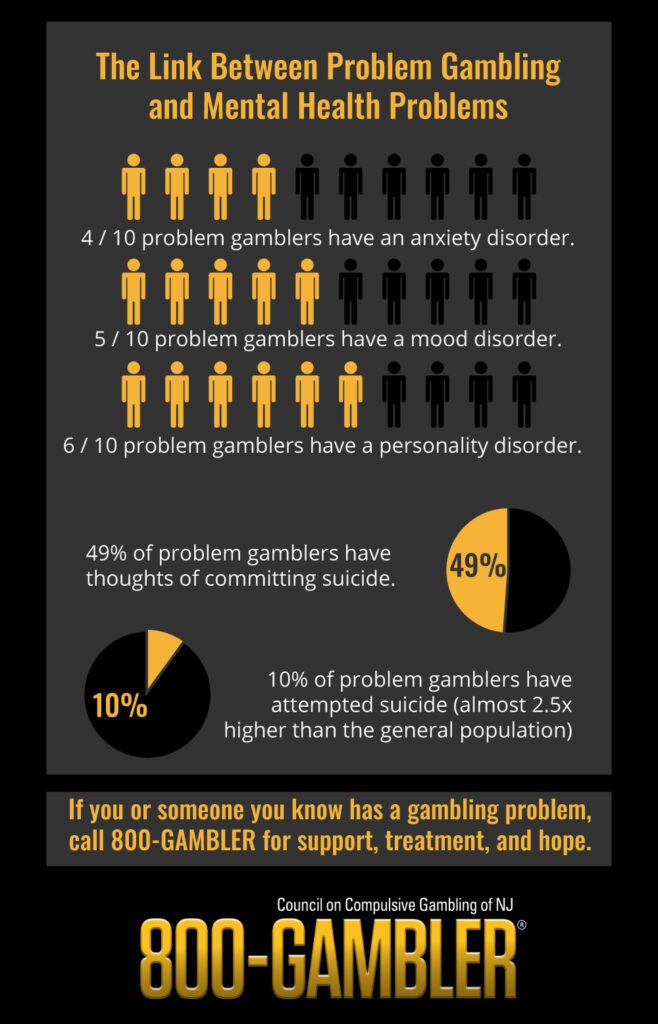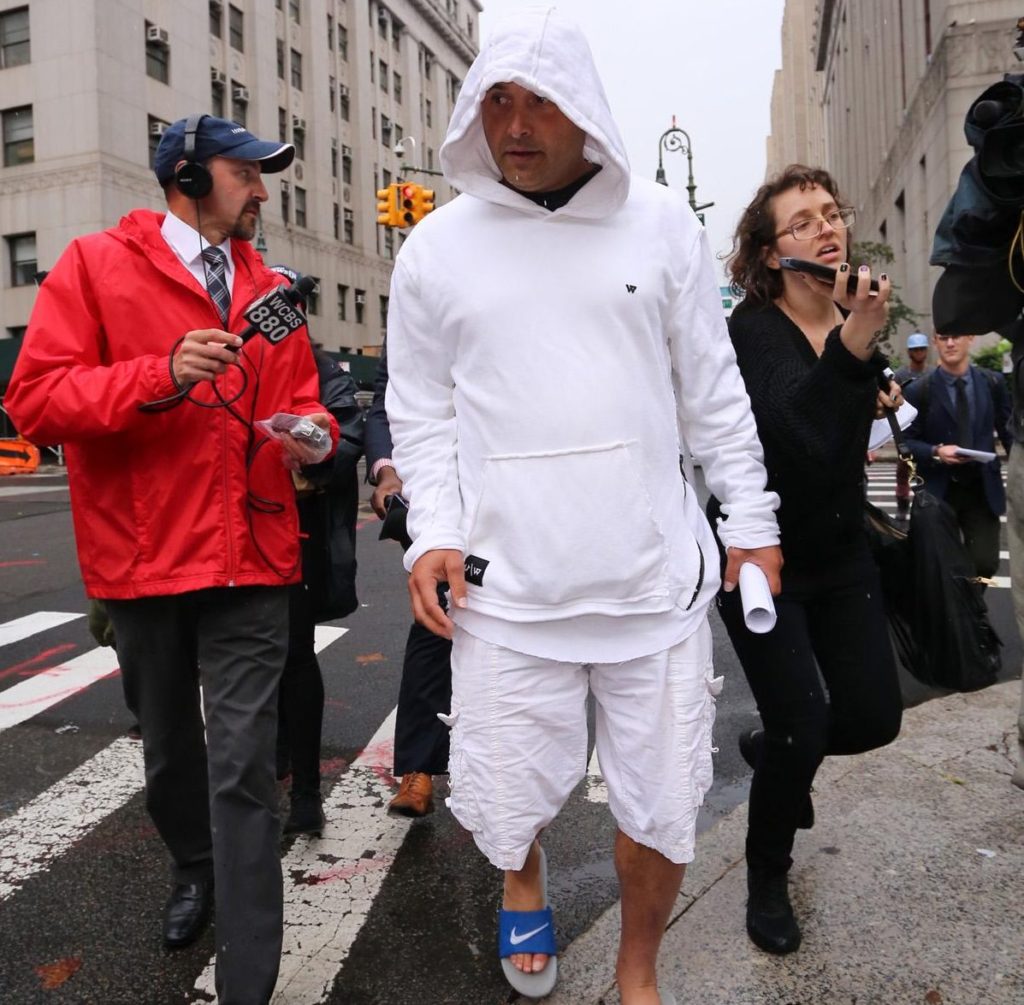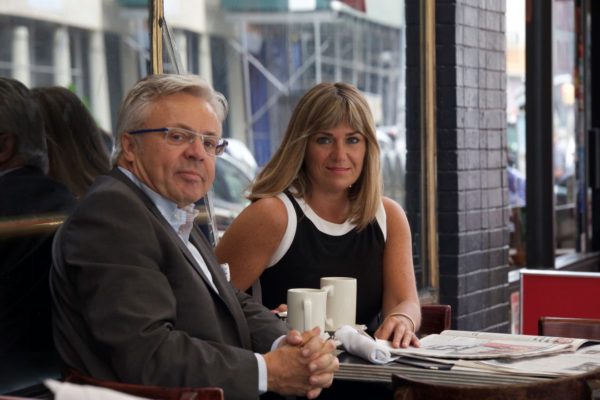It’s a story that seems like it must be fiction. How is it possible, someone could be gambling millions of dollars without the people closest to him knowing? How is it possible, that same person could own their dream job of talking to thousands of people on the radio each day and manage to throw it all away?
The story of former WFAN host Craig Carton is all too real, and as details of his life trickled out in the last three years, his persona extended beyond the polarizing figure we heard behind the mic. Childhood trauma, gambling addiction, fame, fraud, prison, Carton’s story snowballed with unfortunate realities. Directed by Martin Dunn and Marie McGovern of Street Smart Video, the HBO documentary Wild Card: The Downfall Of A Radio Loudmouth details Carton’s rise and fall.

Dunn and McGovern met Craig Carton for the first time in 2015, believing the popular shock jock would be a good fit for a sports-chat TV show they were building. The pilot didn’t go anywhere, but it set the grassroots for a relationship that would later see them tell Carton’s most important story.
When Carton was arrested in Sept. 2017, Dunn and McGovern knew some of the challenges ahead for him. Both veterans of The Daily News, they understood how difficult it could be for a celebrity to be arrested in New York. “We reached out to him and said ‘we’re still your friends, if you need any help or a place to crash for the day, you’re welcome to come to our office’” McGovern remembered.
Carton texted back, ‘thanks,’ and that was it.
After Carton was convicted of fraud, but before he received his sentence, Dunn and McGovern earned press for a Tom Seaver documentary they were working on. Growing up a Mets fan, and having an affinity for Seaver, Carton decided if Dunn and McGovern can tell the story of arguably the greatest pitcher in baseball history, he can trust the directors with his story too.
In general, the topic of a regional sports radio host wouldn’t seem to have national appeal. But viewers don’t need to own any background knowledge of Carton to have an interest in a film about his life.
“We don’t view it as just a sports story, this is a human-interest story,” Dunn said. “It’s a story about someone who got to the very, very top of his profession and through a series of bad decisions, completely blew it.”
Carton was interviewed by Dunn and McGovern before he went to prison in June 2019, and all of the other participants provided their accounts long before anyone knew the radio host would earn an early release one year later. Carton’s former co-host Boomer Esiason and producer Al Dukes acknowledged they were interviewed for the documentary as early as January.
The original plan was to debut the film on HBO in the beginning of June 2020. In fact, it was supposed to close with Carton going to jail, leaving the story somewhat open-ended. But according to Dunn and McGovern, the COVID-19 lockdown delayed the film’s production and release. Around the time the documentary was supposed to premiere, Carton received an early release from prison, not because of COVID, but because of the efforts he made to earn it.

“HBO viewed the delay as an opportunity to put a bow on the story and tie everything together,” McGovern said. “We’re grateful they allowed us to extend the time and get a final interview with Craig because it really does sew up the story and it gives fans of the show closure.”
Carton was a famous person in New York, living a life of what seemed like a fiction movie character and one who the viewer would probably root for. But in watching the non-fiction film, it seemed like Carton bought into that narrative. He didn’t sound bothered by being handed a six-figure bag of cash, he didn’t sound ashamed of losing $2 million in 24 hours or hopping on a helicopter in the middle of the night to play Blackjack hours before work.
“You can see in the very beginning, he’s almost bragging when he says ‘I once won $25,000 in less than five minutes and walked out to go to work,’” McGovern said. “He stopped that story, and we purposely let that shot linger, because there was a smugness about him. And even we thought, ‘You just don’t get it do you? This is not something to be bragging about.’”
But Carton was noticeably different in his final interview with Dunn and McGovern, which occurred after he was released from prison. This time, there was more empathy and less bragging. So much so, that it would have completely changed the scope of the film if all the interviews were conducted after Carton completed his prison sentence.
“When he got out of prison, it was like the lightbulb went on,” said McGovern. “He had a completely different look on his face and I think had we done these interviews after he was released, it wouldn’t be nearly as emotional. He wouldn’t have the anger, the swagger that he had before he was in prison. It would have been a very different Craig.”
Dunn and McGovern were able to witness the transformation as it took place during their multiple visits with Carton at a Lewisburg, PA penitentiary. Although they weren’t able to record those meetings, the filmmakers took a few trips to Lewisburg throughout Carton’s 12 months there, to better understand the living conditions and what he was going through, calling it a sobering experience.
“We first met Craig when he was at the height of his Craig-ness when he was very much Carton-max, this incredibly go-ahead, devil-may-care type guy,” Dunn described. “And to see him in prison as just another one of 300 guys in jail was a very sobering experience for him and us. I don’t think you can go through an experience like that and not come out without change.”
Dunn reiterated how clear the transformation for Carton became during his post-prison interview.
“Even his phraseology, his demeanor, his outlook – we were very taken about how different that was to the pre-prison Craig,” Dunn said. “One of the real interesting things of the film is that at the end he admits it was all nonsense, and that he put everybody at risk by his actions. That was a big admission for Craig to make, and want to make.”
During Carton’s legal proceedings, it was revealed that he became a victim of sexual abuse as an 11-year old child while attending summer camp. It was something he kept private for nearly 40 years, but came close to revealing once before. When writing his 2013 book “Loudmouth,” Carton included a chapter detailing the sexual assault, but his publisher Simon & Schuster omitted the chapter, believing it didn’t fit the memoir’s context. Dunn and McGovern confirmed with the publisher that Carton did write the chapter years before his arrest and they chose to exclude it.
“Rather than asking him about it, we said if you have that chapter, why don’t you just read it? It was very difficult for him, for us, for the entire crew,” Dunn said. “We saw Craig emotionally raw at that time and it was very tough.”
Another admission by Carton came unexpectedly during the film, as he discussed his contemplation of suicide just one month before he was arrested in 2017. In an early meeting about the documentary, Carton told the directors about the mental health effects of gambling addiction, noting that it causes a huge number of people to contemplate suicide. Remembering that when they began filming, McGovern referenced the comment, and asked Carton if he experienced any suicidal thoughts.

“His response was ‘I never saw that question coming.’ He anticipated many of the questions he was going to be asked, but this one sort of caught him off guard,” Dunn remembered. “When he began the story, it sort of caught us off guard too. And talking to his former colleagues, none of them were really aware of the story, except for Charod Williams.”
Charod Williams was one of Carton’s former producers at NJ101.5, and he’s the person Carton called in Aug. 2017, when he felt the urge to jump off a chairlift while vacationing with his wife at Whistler Mountain in British Columbia.
“I lifted the bar up and I’m now inching closer to the edge of the seat. I got very upset and started crying,” Carton says in the film.
“I had this out-loud conversation with myself, ‘Don’t do it! Don’t do it! You are better than this. You are not jumping.’
“As I’m telling myself not to do it, I’m inching closer and closer to the edge of the seat because I’m going, there is no doubt in my mind that I’m jumping off this chair lift, it is just a matter of when.”
It was Williams who received the call from a panicked Carton, and it was Williams who helped calm his friend and former colleague.
After Carton told the story, Dunn and McGovern reached out to Williams, who matched the recount almost word for word. With Carton’s loyalty and current need to build a new show, it wouldn’t be surprising to see the radio star reconnect with his former producer professionally at some point down the road.
In terms of Carton’s reaction to watching the documentary, both Dunn and McGovern said he found it to be “fair.” It can’t be easy for him to re-watch and relive the details from the lowest point in his life. It also can’t be easy to hear the words of his former colleagues and even FBI agents who were involved in his arrest.
Carton has changed, it would be nearly impossible for him to spend a year away from his family, a year in prison and not find some sort of empathy for the people he hurt. But for someone who made a living being brash, outrageous, polarizing and controversial, it’s reasonable to wonder if some of that will be tamed by his newfound compassion.

“I think Craig will be as amusing, as entertaining, as polarizing and controversial as he always was,” Dunn answered. “As he says in the film, it’s the one thing he can do really well. I do think it will be underpinned by a new style and empathy, and I think that will add to the mix, not detract from it.”
When Carton does return to the airwaves, those first days are going to be must-hear radio. Carton will be provided an instant audience when he begins his comeback trail, but his ability to remain interesting will determine how long those listeners stick with him.
Brandon Contes is a former reporter for BSM, now working for Awful Announcing. You can find him on Twitter @BrandonContes or reach him by email at Brandon.Contes@gmail.com.








